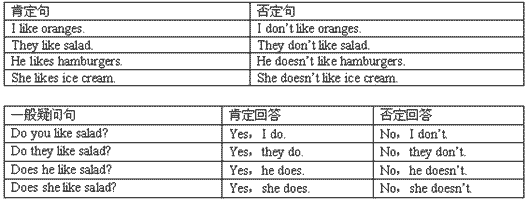用单词的适当形式填空。1. In the evening, my family ______________ (go) to the beach.2. Who is ______________ (run) in the playground.3. Everyone likes to __-五年级英语
题文
| 用单词的适当形式填空。 |
| 1. In the evening, my family ______________ (go) to the beach. 2. Who is ______________ (run) in the playground. 3. Everyone likes to ______________ (get) birthday cards. 4. Our National Day is on October the ______________ (one). 5. I am doing the ______________ (dish). |
答案
| 1. goes 2. running 3. get 4. first 5. dishes |
据专家权威分析,试题“用单词的适当形式填空。1. In the evening, my family ________..”主要考查你对 一般现在时,动词单数第三人称,复数名词,序数词,现在进行时,现在分词,动词不定式 等考点的理解。关于这些考点的“档案”如下:
一般现在时,动词单数第三人称复数名词序数词现在进行时,现在分词动词不定式
考点名称:一般现在时,动词单数第三人称
一般现在时:
表示现在经常反复发生的动作、存在的状态或习惯性的动作的时态。可概括为
①经常性或习惯性动作;
②长期存在的特征或状态;
③普遍真理、客观事实等。
构成:
一般现在时用行为动词的原形,但第三人称单数作主语时,动词的词尾要加-S。
a. 表示经常性或习惯性的动作。
例:Li Ming always helps the old man. 李明一直帮助这位老人。
We usually go to school on foot. 我们通常步行上学。
They sometimes go fishing on Sundays. 他们有时周日去钓鱼。
b. 表示永恒不变的事实或真理。
例:A bird flies with wings. 鸟用翅膀飞翔。
c. 用在格言、谚语中。
例:Pride goes before a fall. 骄者必败。- 一般现在时具体用法:
1.表示经常的或习惯性的动作,常与表示频率的时间状语连用。
时间状语:
always,usually,every morning/night/evening/day/week/year,often,sometimes,
occasionally,from time to time,twice a week,rarely,seldom,once a month,hardly,ever,never.
e.g: I leave home for school at 7:00 every morning.
2.表示主语具备的性格、能力、特征和状态。
e.g:I don't want so much.
Ann Wang writes good English but does not speak well.
比较:Now I put the sugar in the cup.
I am doing my homework now.
3.表示客观事实和普遍真理。
e.g :The earth moves around the sun.
Shanghai lives in the east of China.
4.在时间状语从句和条件状语从句中,常用一般现在时代替将来时。
5.表示预先计划或安排好的行为。
6.小说故事用一般现在时代替一般过去时。新闻报道类的内容,为了体现其“新鲜”性,也用一般现在时来表示过去发生的事情。
7.有些表示状态和感觉的动词表示现在发生的具体行为时,只用一般现在时,而不用进行时态。
8.表示现在发生的具体动作或存在的状态
9表示格言或警句中。 e.g Pride goes before a fall. 骄者必败。
注意:此用法如果出现在宾语从句中,即使主句是过去时,从句谓语也要用一般现在时。
例:Columbus proved that the earth is round..
第一句用一般现在时,用于操作演示或指导说明的示范性动作,表示言行的瞬间动作。
再如:Now watch me,I switch on the current and stand back.
第二句中的now是进行时的标志,表示正在进行的动作的客观状况,所以后句用一般现在时。 - 一般现在时用法表:

第三人称单数的构成见下表:
不规则变化have和be动词 变have为has 变be为am,is,are例: have-has; be-am,is,are词
构成
举例
一般情况
词尾+s
动词原形
第三人称单数
work(工作)
stop(停止)works
stops以-ch, -sh, s, x, o结尾
词尾+es
teach(教)
wash(洗)
dress(装扮)
fix(安装)
go(去)teaches
washes
dresses
fixes
goes以“辅音字母+y”结尾
变y为i,再加es
fly(飞翔)
try(尝试)flies
tries 一般现在时的特殊用法:
一些动词可用一般现在时来表达现在进行时:
verbs of the senses: hear,see,taste,smell,feel
verbs of the thinking: believe,know,mean,realize,think,remember
verbs of the linking: dislike,fear,heat,like,love,want
verbs of the possession: belong,have,own,possess
考点名称:复数名词
- 复数名词:
指名词的数量大于“一”,如:two books, some students
名词变复数:
1、一般情况下,词尾加s。如:students,apples,bags,trees,books,brothers
2、s,x,z,sh,ch等结尾的名词,词尾加es。如:glasses,boxes,brushes,matches
3、y结尾的名词分两种情况,“辅音字母+y”结尾的名词,将y变为ies;
“元音字母+y”结尾的名词,直接在词尾加s。
以辅音字母加y结尾的名词,变y为i加es:cities,babies,enemies。
以元音字母加y结尾的名词,如:boys
4、f或fe结尾的名词,一般将f或fe变为ves。如:leaf-leaves, wife-wives, knif-knives
5、规则名词:foot→feet,tooth→teeth, child→children,man→men, woman→women,
sheep→sheep,deer→deer, mouse→mice. - 名词变复数规则:

![Danny apairofskates.[ ]A.hasB. haveC. is-六年级英语](http://www.00-edu.com/d/file/ks/4/1/47/2019-08-24/smallfac5032aba6ffd5133224fbfd6f627641566585773.png)
![I have a telescope; my sister _____ one, too. [ ]A. have B. /C. has-六年级英语](http://www.00-edu.com/d/file/ks/4/1/47/2019-08-24/small95b931d9eba0d6e0d51fcb17c976b6ab1566587233.png)
![Mysister_________ tea.[ ]A.doB.makeC.makes-二年级英语](http://www.00-edu.com/d/file/ks/4/1/47/2019-08-24/smalld9c80030fe676239effad1766f1ca9c91566585454.png)
![John _____________ a stamp for his letter. [ ]A. needB. needsC. needing-五年级英语](http://www.00-edu.com/d/file/ks/4/1/47/2019-08-24/smallcebb0f01dc82000e4d9f8a50418bc5e51566586956.png)
![It'sred.It __________ abandageonit![ ]A. have B. has-五年级英语](http://www.00-edu.com/d/file/ks/4/1/47/2019-08-24/smallcf3a20012c2087fbeb76d9ac03e80fe91566585957.jpg)
